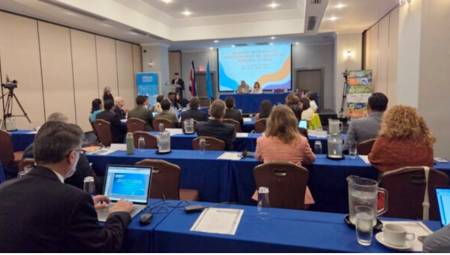 A tour of the brewing process leads us to discover the importance of refrigeration during its manufacture, as well as the actions that can be taken to achieve a more efficient process.
A tour of the brewing process leads us to discover the importance of refrigeration during its manufacture, as well as the actions that can be taken to achieve a more efficient process.
by Alejandra García Vélez
There is no denying that beer consumption in Latin America is increasing, so the needs of the production plants of this type of beverage must also adapt to a market that demands a greater amount of product with the best quality standards.
And it is precisely there, in quality, where refrigeration plays a fundamental role. Unlike other types of beverages and foods, dairy or meat for example, in this market the cold is not essential for transport and storage, but it is vital during the elaboration to give beer all the properties that make it so desired by consumers.
Market strength
A study conducted by the Kirin Institute on global beer production by country in 2010 concluded that global production amounted to 185.62 million kilolitres in 2010; an increase of 2.2% compared to 2009, in addition to marking 26 consecutive years of growth.
It is important to highlight that Latin America is, along with Asia, the fastest growing region in this field and one of the main reasons for the sustained increase in the production of this drink worldwide.
Although in Asia the volume of beer production in 2010 increased by 5.4% from its level of the previous year, being the largest beer producing region in the world with a share of 33.3%, Latin America, presented not insignificant levels with an increase in 2010 of 5.1% over the previous year, to reach a share of 16.5% of the global market.
Likewise, within the region, the role of Brazil stands out, a country that achieved an 18% growth in its production by 2010 and became the third largest beer producer, after China and the United States, in the world.
Although Latin America managed to grow for the eighth consecutive year, thanks mainly to the good momentum of the Brazilian economy, Mexico, Colombia, Venezuela and Argentina also stand out among the beer producing countries, ranking in positions number 6, 16, 17 and 22, respectively, for 2010.
Precisely because of the important role played by Latin America in the world beer market, and the need to guarantee effective refrigeration processes during their elaboration, Refriaméricas 2011 had the participation of Juan Carlos Hoyos Rendón, sustainable development manager of Bavaria S.A., to share some of the experiences of this company.
At the conference led by the representative of Bavaria, the topic "Sustainable beverage plants: Technologies and facilities to achieve sustainable projects" was addressed, in which Rendón described the experience of Bavaria-SAB Miller in this field.
In this article we will also have the opinion of Luz Elena Arboleda, production manager of Inducerv S.A., who spoke in detail about the brewing process and the importance of performing each step with precision.
Experiences
To begin with, Arboleda explained that it is essential to properly regulate the temperature of the must (mixture of water with ground malts), which must go from being boiling to reaching an optimal temperature at the time of joining with the yeast to begin fermentation. In the case of products made by Inducerv S.A. this temperature must be 20ºC or 13ºC depending on the type of yeast.
Arboleda explains that the process is carried out through the use of a stainless steel plate heat exchanger, using first water at room temperature and then glycol water.
Similarly, the tanks in which the wort and yeast perform the fermentation process must be constantly refrigerated, due to the exothermic nature of this activity. That is why it is necessary to have a programmable control that supervises and ensures that the temperature is maintained at the ideal point for the elaboration of the product.
Once the previous step has been completed, the temperature must decrease to 2ºC to enter a stage of maturation that is vital for its role in the refining of the flavor and the clarification of the beer. That is why it is essential that the equipment is perfectly calibrated, since the variations in the temperature level will be directly reflected in the quality of the drink.
Arboleda does not hesitate to affirm that once the elaboration of the product is finished, the fact that the cold chain is broken at the time of transport or storage is not critical. The real role of refrigeration is at the production stage.
"For the conservation of the product it is important that it does not receive direct sun to maintain its properties and extend its shelf life, but there is no danger that the product will be damaged by the absence of cold, as it happens with meat or dairy, so it can be stored at room temperature," he says.
Sustainable beer
For his part, Rendón highlights the need to make the brewing process sustainable, supported by the implementation of different strategies that allow a company to reduce its carbon footprint.
When talking about sustainability in this area, Rendón does not refer exclusively to the use of environmentally friendly equipment or refrigerants that do not affect the ozone layer, but to a series of transversal actions to all processes, which together allow a general reduction inCO2 emissions derived from the production of beer or other products.
In that sense, the official points out that "sustainability, understood as responsible corporate care in the social, economic and environmental fields, is today part of the DNA of Bavaria-SAB Miller and is a fundamental element to guarantee the permanence of the company in the long term".
Rendón also points out that sustainability is a differentiating element, which contributes in a fundamental way in the construction of reputation of organizations and is also a powerful relationship factor.
In addition, this expert warns that all organizations will be forced to migrate towards these principles, otherwise their activities will not be sustainable before regulatory bodies and will be subject to strong controls.
As for the specific strategies implemented by Bavaria, Rubén explains that they have 10 priority actions among which stand out: making more beer using less water, encouraging business development in the value chain, reducing the carbon and energy footprint, reusing and recycling packaging and packaging materials, working towards operations with zero waste.
In the same way, it talks about the factors that can be controlled during the cold chain of beverages to reduce their environmental impact. For example, the use of refrigerant gases that do not contribute to the destruction of the ozone layer or global warming, the selection of blowing and insulating materials that generate a lower environmental impact.
Also, taking into account its life cycle, reduce energy consumption in engines and cooling processes and take advantage of all elements that are recyclable or reusable, including lubricating oils from compressors.













